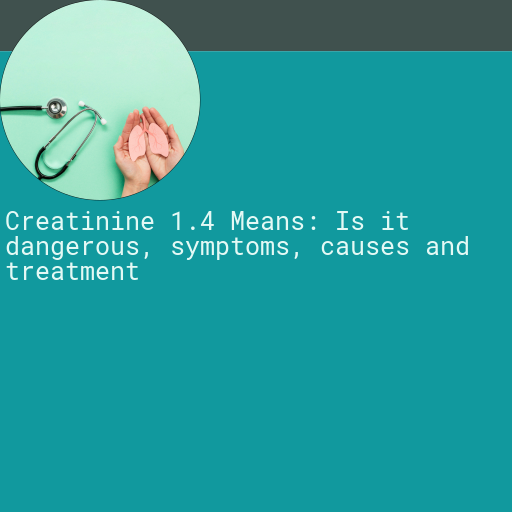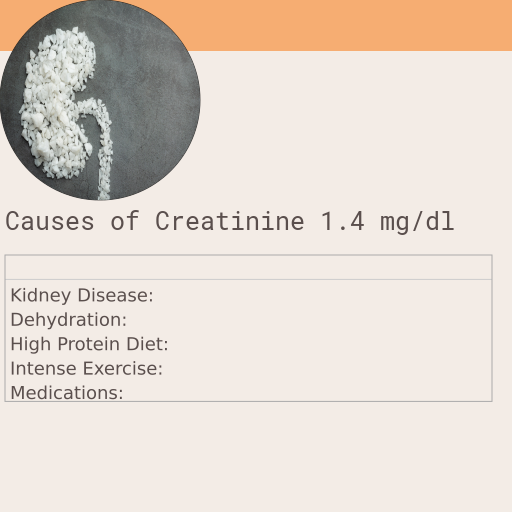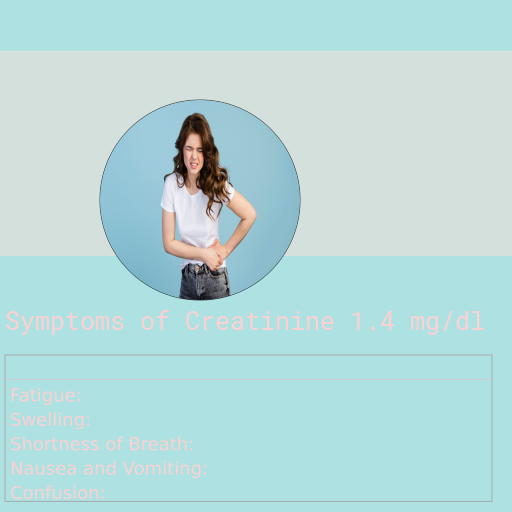Creatinine 1.4 : Is it Dangerous, Causes, Symptoms and More
When it comes to understanding our body's health indicators, creatinine levels play a significant role. Elevated creatinine can be a sign of underlying health issues, and a reading of 1.4 might raise some concerns. In this blog, we'll delve into the dangers associated with high creatinine levels, explore the potential causes, and identify common symptoms to watch out for. Understanding these factors can help you take proactive steps towards maintaining optimal kidney function and overall health.

What is Creatinine
Creatinine is a byproduct of the normal breakdown of muscle tissue and protein metabolism. Unlike other substances that the body can repurpose, creatinine serves as a waste product with no use in the body. It is filtered out of the bloodstream by the kidneys and excreted in the urine. Elevated levels of creatinine in the blood can be a sign of kidney dysfunction or other underlying health issues, making it essential to monitor and investigate any significant changes in creatinine levels.
- Meat Consumption: Creatinine is a byproduct of creatine, which is found in muscle tissue. Therefore, eating meat, especially red meat, can increase creatinine levels.
- Muscle Breakdown: Intense exercise or muscle injury can lead to the breakdown of muscle tissue, releasing more creatinine into the bloodstream.
- Supplements: Taking creatine supplements, commonly used to enhance athletic performance, can also elevate creatinine levels.
- Kidney Function: The kidneys filter creatinine from the blood. Impaired kidney function can lead to a buildup of creatinine in the bloodstream.
- Dehydration: Low fluid intake can concentrate the levels of creatinine in the blood, making it appear higher than it actually is.
- High-Protein Diet: Diets rich in protein can contribute to increased creatinine levels due to the breakdown of protein into creatinine.
- Medications: Certain medications can affect kidney function and alter creatinine levels. Examples include nonsteroidal anti-inflammatory drugs (NSAIDs) and some antibiotics.
- Chronic Diseases: Conditions like diabetes and high blood pressure can impair kidney function over time, leading to increased creatinine levels.
- Age and Gender: Muscle mass tends to decrease with age, which can affect creatinine levels. Men generally have higher levels than women due to greater muscle mass.
Normal Range of Creatinine in Adults
In adults, the normal range of creatinine levels in the blood typically falls between 0.6 to 1.2 milligrams per deciliter (mg/dL) for men and 0.5 to 1.1 mg/dL for women. These values can vary slightly depending on the laboratory and the individual's muscle mass, age, and overall health. Maintaining creatinine levels within this range is crucial for ensuring proper kidney function and overall health. Elevated levels may indicate potential kidney issues or other health concerns, warranting further medical evaluation.
| Age Group | Normal Creatinine Range (mg/dL) |
|---|---|
| Infants (0-1 year) | 0.2 - 0.4 |
| Children (1-12 years) | 0.3 - 0.7 |
| Adolescents (13-18 years) | 0.5 - 1.0 |
| Adults (Male) | 0.7 - 1.3 |
| Adults (Female) | 0.6 - 1.1 |
| Elderly (60+ years) | 0.6 - 1.2 |
Causes of Creatinine 1.4
Elevated creatinine levels can be a cause for concern, as they often indicate that your kidneys may not be functioning properly. There are several factors that can lead to an increase in creatinine levels, including chronic kidney disease, dehydration, and high protein intake. In some cases, certain medications or strenuous exercise can also cause a temporary rise in creatinine. Understanding the underlying causes of elevated creatinine is crucial for determining the appropriate course of action and ensuring that your kidneys remain healthy.
- Kidney Disease: Chronic kidney disease or acute kidney injury can significantly elevate creatinine levels.
- Dehydration: Insufficient fluid intake can concentrate creatinine in the blood.
- High Protein Diet: Consuming large amounts of protein can temporarily increase creatinine levels.
- Intense Exercise: Strenuous physical activity can cause muscle breakdown, releasing creatinine into the bloodstream.
- Medications: Certain drugs, especially those affecting kidney function, can raise creatinine levels.
- Diabetes: Poorly controlled diabetes can lead to kidney damage, impacting creatinine clearance.
- High Blood Pressure: Hypertension can damage the kidneys over time, leading to elevated creatinine levels.
- Urinary Tract Blockage: Conditions like kidney stones or an enlarged prostate can obstruct urine flow, increasing creatinine.

Symptoms of Creatinine 1.4
Elevated creatinine levels can be a cause for concern as they may indicate underlying issues with kidney function. While it's not uncommon for levels to fluctuate, consistently high creatinine can be a sign of more serious health problems. Symptoms of elevated creatinine can vary but often include fatigue, swelling in the legs or face, shortness of breath, and a decrease in urine output. Recognizing these symptoms early can be crucial for timely intervention and treatment.
- Fatigue: Elevated creatinine levels can lead to a constant feeling of tiredness and lack of energy.
- Swelling: Noticeable swelling, particularly in the legs, ankles, and feet, can occur due to fluid retention.
- Shortness of Breath: Difficulty breathing might be experienced as fluid builds up in the lungs.
- Nausea and Vomiting: High creatinine levels can cause gastrointestinal disturbances, making you feel nauseous or leading to vomiting.
- Confusion: Mental fog or confusion can occur as a result of high creatinine affecting brain function.
- High Blood Pressure: Elevated creatinine is often associated with hypertension, which can exacerbate kidney issues.
- Decreased Urine Output: A significant drop in the amount of urine produced can be a sign of kidney dysfunction.
- Muscle Cramps: Painful cramps or muscle spasms can be a symptom of high creatinine levels.

Dangers of Creatinine 1.4
Understanding the implications of elevated creatinine levels is crucial for maintaining kidney health. While creatinine itself does not directly harm the body, it serves as a significant indicator of underlying issues such as kidney failure or other medical conditions. Elevated creatinine levels suggest that the kidneys are not functioning properly, which can lead to the accumulation of other harmful waste products like urea. These waste products can have detrimental effects on the body, causing symptoms like fatigue, swelling, and more severe health complications if left untreated.
- Kidneys: Elevated creatinine levels can indicate kidney dysfunction, potentially leading to chronic kidney disease or acute kidney injury.
- Heart: High creatinine levels may be linked to increased risk of cardiovascular diseases, including heart attacks and heart failure.
- Liver: Although primarily associated with kidney function, elevated creatinine can sometimes signal liver disorders due to the liver's role in metabolism.
- Muscles: High creatinine levels may indicate muscle damage or diseases such as rhabdomyolysis, where muscle fibers break down and release toxins into the bloodstream.
- Lungs: In severe cases, elevated creatinine can be associated with pulmonary edema, a condition where fluid accumulates in the lungs.
- Gastrointestinal Tract: Elevated levels can lead to symptoms like nausea and vomiting, which are often signs of underlying kidney issues.
- Brain: Significant kidney dysfunction and high creatinine levels can cause encephalopathy, resulting in confusion, agitation, or even seizures.
- Skin: Chronic kidney issues indicated by high creatinine can lead to skin changes such as dryness, itchiness, and an overall unhealthy appearance.
Home remedies for Creatinine 1.4
Disclaimer: Elevated creatinine levels cannot be treated at home, and professional medical attention is crucial. If you suspect high creatinine levels, consult a healthcare provider immediately. While waiting for medical advice, basic supportive care can include staying hydrated, avoiding strenuous activities, and limiting protein intake. However, these measures are not substitutes for professional diagnosis and treatment. Always seek medical advice to address elevated creatinine levels effectively.
- Stay Hydrated: Drinking plenty of water can help your kidneys function better and flush out toxins, potentially lowering creatinine levels.
- Adopt a Kidney-Friendly Diet: Focus on eating fruits, vegetables, whole grains, and lean proteins. Avoid high-sodium, high-potassium, and high-phosphorus foods.
- Limit Protein Intake: High-protein diets can increase creatinine levels. Opt for smaller portions of protein and choose plant-based options when possible.
- Avoid Over-the-Counter Painkillers: Nonsteroidal anti-inflammatory drugs (NSAIDs) like ibuprofen can harm your kidneys. Consult your doctor for safer alternatives.
- Monitor Blood Pressure and Blood Sugar: High blood pressure and diabetes can affect kidney function. Regularly check your levels and follow your doctor's recommendations.
Treatment for Creatinine 1.4
When dealing with a creatinine level of 1.4, it is crucial to seek medical treatment from a doctor to address the underlying causes and prevent further complications. The primary treatment goals often include stabilizing kidney function, which ensures that the kidneys continue to filter waste effectively. Additionally, stopping or adjusting any harmful medications that may be contributing to elevated creatinine levels is essential. Another critical aspect of treatment involves treating any infections that could be affecting kidney performance, thereby helping to restore normal function and reduce creatinine levels in the blood.
- Stay Hydrated: One of the simplest and most effective ways to manage elevated creatinine levels is by ensuring you drink enough water. Proper hydration helps the kidneys filter waste more efficiently.
- Dietary Adjustments: Reducing the intake of protein-rich foods and salt can lessen the burden on your kidneys. A doctor may recommend a diet that focuses on fruits, vegetables, and whole grains.
- Medications: Depending on the underlying cause of elevated creatinine, your doctor may prescribe medications to control conditions like high blood pressure or diabetes, which can contribute to kidney stress.
- Avoid Nephrotoxic Drugs: Some medications and supplements can harm the kidneys. It's crucial to inform your healthcare provider about all the medications you're taking to avoid those that could worsen kidney function.
- Regular Monitoring: Keeping track of your creatinine levels and overall kidney function through regular blood tests can help manage and adjust treatment plans as needed. Frequent monitoring allows for early intervention if levels rise further.
GFR with Creatinine of 1.4
When discussing kidney health, it's crucial to understand the concept of Glomerular Filtration Rate (GFR). GFR is a measure of how well your kidneys are filtering blood and removing waste products like creatinine. While an elevated creatinine level, such as 1.4, might raise concerns, it's essential to look at the GFR to get a complete picture. This is because GFR takes into account factors like age, sex, and body size, providing a more accurate assessment of kidney function. By focusing on GFR, healthcare providers can better determine the severity of kidney issues and tailor treatments more effectively, rather than relying solely on the absolute value of creatinine. In essence, GFR offers a comprehensive view of kidney health, making it a more reliable indicator than creatinine levels alone.
| GFR Grade | GFR Value (mL/min/1.73 m²) | Meaning |
|---|---|---|
| G1 | > 90 | Normal or high |
| G2 | 60-89 | Mildly decreased |
| G3a | 45-59 | Mild to moderately decreased |
| G3b | 30-44 | Moderately to severely decreased |
| G4 | 15-29 | Severely decreased |
| G5 | < 15 | Kidney failure |
What is my GFR for a creatinine of 1.4
| Age | Gender | GFR |
|---|---|---|
| 18 | male | 66.01 ml/m2 |
| 45 | male | 54.8 ml/m2 |
| 60 | male | 51.69 ml/m2 |
| 80 | male | 48.76 ml/m2 |
| 18 | female | 48.98 ml/m2 |
| 45 | female | 40.66 ml/m2 |
| 60 | female | 38.36 ml/m2 |
| 80 | female | 36.18 ml/m2 |
Table of danger posed by Creatinine 1.4 in male across different ages
| Age Group | Is Creatinne of 1.4 dangerous? |
|---|---|
| 25yrs - 29 yrs | above normal, not dangerous |
| 29yrs - 95 yrs | significantly high, but not dangerous, needs attention |
Table of danger posed by Creatinine 1.4 in female across different ages
| Age Group | Is Creatinne of 1.4 dangerous? |
|---|---|
| 25yrs - 28 yrs | significantly high, but not dangerous, needs attention |
| 28yrs - 95 yrs | bad, and could be dangerous, Consult a doctor |

Which other tests should be done for a creatinine value of 1.4?
While a creatinine level of 1.4 may raise concerns, it's crucial to consider a comprehensive evaluation through additional tests to get a full picture of kidney health. Tests like electrolytes, renal profile, and blood gas levels can provide valuable insights into your overall kidney function and metabolic state. For instance, electrolyte tests measure the levels of essential minerals like sodium and potassium, which are vital for various bodily functions. The renal profile includes a range of tests that assess different aspects of kidney performance, such as blood urea nitrogen (BUN) and glomerular filtration rate (GFR). Blood gas levels, on the other hand, help evaluate the acid-base balance and oxygenation status in your blood, which can be disrupted in cases of severe kidney dysfunction. Together, these tests offer a more detailed and accurate understanding of your health, aiding in timely and effective treatment decisions.
- Electrolytes: This test measures the levels of essential minerals such as sodium, potassium, chloride, and bicarbonate in the blood. Abnormal electrolyte levels can indicate kidney dysfunction or other metabolic issues.
- Renal Profile: A comprehensive renal profile includes tests like creatinine, urea, and glomerular filtration rate (GFR). These tests provide a detailed assessment of kidney function and can help identify the extent of renal impairment.
- Blood Gas Levels: An arterial blood gas (ABG) test measures the levels of oxygen and carbon dioxide in the blood, as well as the blood's pH. Abnormal results can indicate respiratory or metabolic problems, which may be associated with kidney issues.
- HbA1c: Hemoglobin A1c is a test that measures average blood glucose levels over the past three months. Elevated HbA1c levels can indicate poorly controlled diabetes, a condition that can significantly impact kidney function.
- Liver Enzymes: Tests for liver enzymes such as ALT, AST, and ALP can help determine liver function. Since the liver and kidneys work closely to detoxify the body, abnormalities in liver enzymes can sometimes correlate with kidney issues.

 By: Dr.Bhargav Raut
By: Dr.Bhargav Raut